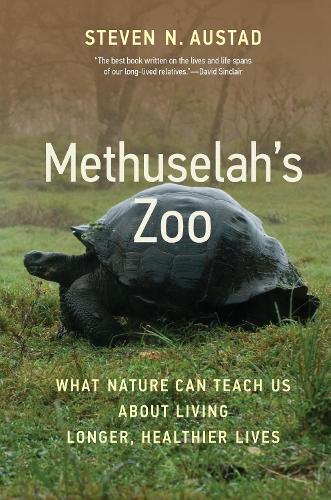
Methuselah's Zoo: What Nature Can Teach Us about Living Longer, Healthier Lives
(Hardback)
Available Formats
Publishing Details
Methuselah's Zoo: What Nature Can Teach Us about Living Longer, Healthier Lives
By (Author) Steven N. Austad
MIT Press Ltd
MIT Press
5th October 2022
12th August 2022
United States
Classifications
General
Non Fiction
591.4
Physical Properties
Hardback
312
Width 152mm, Height 229mm
Description
Stories of long-lived animal species-from thousand-year-old tubeworms to 400-year-old sharks-and what they might teach us about human health and longevity. Opossums in the wild don't make it to the age of three; our pet cats can live for a decade and a half; cicadas live for seventeen years (spending most of them underground). Whales, however, can live for two centuries and tubeworms for several millennia. Meanwhile, human life expectancy tops out around the mid-eighties, with some outliers living past 100 or even 110. Is there anything humans can learn from the exceptional longevity of some animals in the wild In Methusaleh's Zoo, Steven Austad tells the stories of some extraordinary animals, considering why, for example, animal species that fly live longer than earthbound species and why animals found in the ocean live longest of all. Austad-the leading authority on longevity in animals-argues that the best way we will learn from these long-lived animals is by studying them in the wild. Accordingly, he proceeds habitat by habitat, examining animals that spend most of their lives in the air, comparing insects, birds, and bats; animals that live on, and under, the ground-from mole rats to elephants; and animals that live in the sea, including quahogs, carp, and dolphins. Humans have dramatically increased their lifespan with only a limited increase in healthspan; we're more and more prone to diseases as we grow older. By contrast, these species have successfully avoided both environmental hazards and the depredations of aging. Can we be more like them
Reviews
"For aspiring scientists and health care advocates."
Library Journal
It was refreshing to read Methuselahs Zoo, the latest book from biologist Steven Austad, who expresses with clarity what we know and what we dont know about aging.
Science
I recommend Methuselahs Zoo . . . a smartly written book . . . an entertaining tour of the whole animal kingdom in all its mad variety. I had no idea I would so enjoy reading about the naked mole rat, or indeed the human fish, a type of salamander that lurks in Balkan caves . . . Austad knows more about his subject than anyone on the planet.
The Telegraph
Author Bio
Steven N. Austad is Distinguished Professor of Biology at the University of Alabama at Birmingham and the inaugural holder of the UAB Protective Life Endowed Chair in Healthy Aging. He is the author of Why We Age- What Science Is Discovering about the Body's Journey through Life and Real People Don't Own Monkeys. Among his many varied jobs before becoming an academic, Austad was a Hollywood lion trainer and a naturalist guide for the Harvard Museum of Comparative Zoology, traveling to Antarctica, the Galapagos, New Guinea, Ethiopia, Siberia, Mongolia, and elsewhere.
